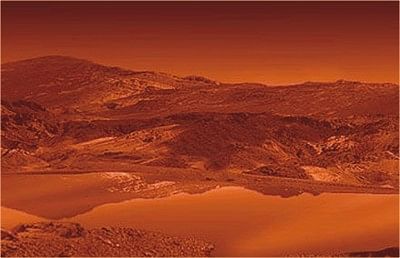Does Titan support life?

Artist's impression of a mirror-smooth lake on the surface of Saturn's smoggy moon Titan
OF late, extra-terrestrial civilization has gained some importance both in the realms of science and fiction. According to Hubble Telescope's observation, there are at least 6.25 billion life-supporting solar systems out there! Even the legendary theoretical physicist Dr. Stephen Hawking has voiced the possibility of much advanced extra-terrestrial civilization somewhere in this universe. Within our solar system there are indeed some strong candidates that scientists believe harbour alien life. These include Mars, Europa and now Titan, Saturn's largest moon. Two very recent findings from NASA's Cassini spacecraft, of which the details have been published in the journal Icarus and the Journal of Geophysical Research, have suggested the possibility of alien life-forms on Titan. Observations with the spacecrafts Ion and Neutral Mass Spectrometer and the probe's Composite Infrared Spectrometer revealed that hydrogen, produced by UV-triggered chemical reactions in the planet's atmosphere, is flowing down Titan's atmosphere and then disappearing at the surface. According to astro-biologist Chris McKay at NASA Ames Research Center, this could be a tantalizing hint that hydrogen is getting consumed by life. In his own words, "It's the obvious gas for life to consume on Titan, similar to the way we consume oxygen on Earth". And at the same tim, another study investigating hydrocarbons on Titan's surface found out with the aid of the probe's Visual and Infrared Mapping Spectrometer (VIMS), that there is big shortage of Acetylene, a chemical compound that could be consumed as food by life-forms that relies on liquid methane instead of liquid water to survive. According to Dr. McKay, "If these signs turn out to be a sign of life, it would be doubly exciting because it would represent a second form of life independent from water-based life on Earth".
Now the question comes, why Titan? In response, few words are in order in honour of the solar system's second largest moon. Titan is the only natural satellite known to have a dense atmosphere and the only object other than Earth to have clear evidence of stable bodies of surface liquids (liquid hydrocarbon lakes in the satellite's Polar Regions). The planet has been viewed as similar to the early Earth and thus been suspected of hosting microbial extra-terrestrial life-forms. It's been strongly suggested that methane-based (rather than water-based like here on Earth) extra-terrestrial life-forms could exist on Titan, where organisms called methanogens survive by consuming hydrogen, acetylene and ethane. Despite the "too early to tell attitude" from scientists, the recent findings do echo on the possibility of methane-based life-forms on Titan. It must be mentioned here that it was Dr. Chris McKay along with Heather R Smith of International Space University, Strasbourg, France, who were the first ones to state that methane based microbes could "eke out an existence" by breathing hydrogen gas and eating the organic molecule acetylene, creating methane in the process. And now findings from Cassini probe echo out these predictions that were made back in 2005.
But researchers are cautioning against any such conclusions. Dr. Darrell Strobel, a Cassini interdisciplinary scientist based in John Hopkins University who also authored the paper in the journal Icarus, believes the dearth of hydrogen that Cassini detected is consistent with conditions that could produce methane-based life, but do not conclusively prove its existence. And as far as the lack of acetylene is concerned, other scientists believe that sunlight or cosmic rays are transforming the acetylene in icy aerosols in the atmosphere into more complex molecules that would fall to the ground with no acetylene signature. All in all, experts believe that, these simply imply that Titan is indeed a dynamic place where organic chemistry is happening right now. Principal investigator with the NASA Astrobiology Institute Titan team Dr. Mark Allen believes, "Scientific conservatism suggests that a biological explanation should be the last choice after all non-biological explanations are addressed". In other words, a lot of work needs to be done to rule out the possible non-biological explanations before firmly establishing that these recent occurring in Titan are the work of some extra-terrestrial life-forms.

 For all latest news, follow The Daily Star's Google News channel.
For all latest news, follow The Daily Star's Google News channel. 



Comments